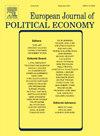在不同类型的名单比例代表制下,政党推选人、选民和生产代表的选择
IF 2.4
3区 经济学
Q2 ECONOMICS
引用次数: 0
摘要
是政党遴选者还是选民选择了更有成效的政治家?遴选者可能会提拔高素质的候选人,并比选民更有信息优势,但高素质并不一定是提名的关键标准,选民可能有足够的信息来纠正低劣的决策。我们通过实证研究来探讨负责遴选的委托人类型是否会影响个人的议会工作(出席率、议案、修正案、质询、演讲)。在这种情况下,灵活名单比例代表制既有趣又有分析价值,因为政党内的席位首先分配给达到一定个人票数的候选人,其余席位则根据选举前的名单排名来分配。这样,我们就可以比较三种类型的当选候选人:选择者选择的代表、选民选择的代表和双重选择的代表。通过分析捷克共和国 2002 年至 2021 年期间的数据,我们发现选民比遴选者更青睐正规教育程度高的候选人。我们没有发现遴选者选择类型和选民选择类型在议会行为上的差异。结果表明,在赋予选民对党内席位分配的更大影响力与所选代表的质量之间可能存在权衡。本文章由计算机程序翻译,如有差异,请以英文原文为准。
Party selectors, voters, and the choice of productive representatives under different types of list proportional representation
Do party selectors or voters choose more productive politicians? Selectors may promote quality candidates and have an informational advantage over voters, but quality need not be the key criterion for nominations, and voters may be sufficiently informed to correct inferior decisions. We empirically examine whether the type of principal responsible for the selection affects individual parliamentary work (attendance, bills, amendments, questions, speeches). Flexible-list proportional representation systems are both interesting and analytically useful in this context, since seats within parties are first allocated to candidates reaching a certain number of personal votes, while any remaining seats are awarded based on the pre-electoral list rank. This allows us to compare three types of elected candidates: selector-chosen, voter-chosen, and doubly-chosen representatives. Analysing data from the Czech Republic in the period between 2002 and 2021, we find that voters have a stronger preference for candidates with high formal education than selectors. We do not find differences in parliamentary behaviour between selector-chosen and voter-chosen types. The results speak against a potential trade-off between giving voters more influence on within-party seat allocation and the quality of chosen representatives.
求助全文
通过发布文献求助,成功后即可免费获取论文全文。
去求助
来源期刊

European Journal of Political Economy
Multiple-
CiteScore
3.40
自引率
10.00%
发文量
106
期刊介绍:
The aim of the European Journal of Political Economy is to disseminate original theoretical and empirical research on economic phenomena within a scope that encompasses collective decision making, political behavior, and the role of institutions. Contributions are invited from the international community of researchers. Manuscripts must be published in English. Starting 2008, the European Journal of Political Economy is indexed in the Social Sciences Citation Index published by Thomson Scientific (formerly ISI).
 求助内容:
求助内容: 应助结果提醒方式:
应助结果提醒方式:


